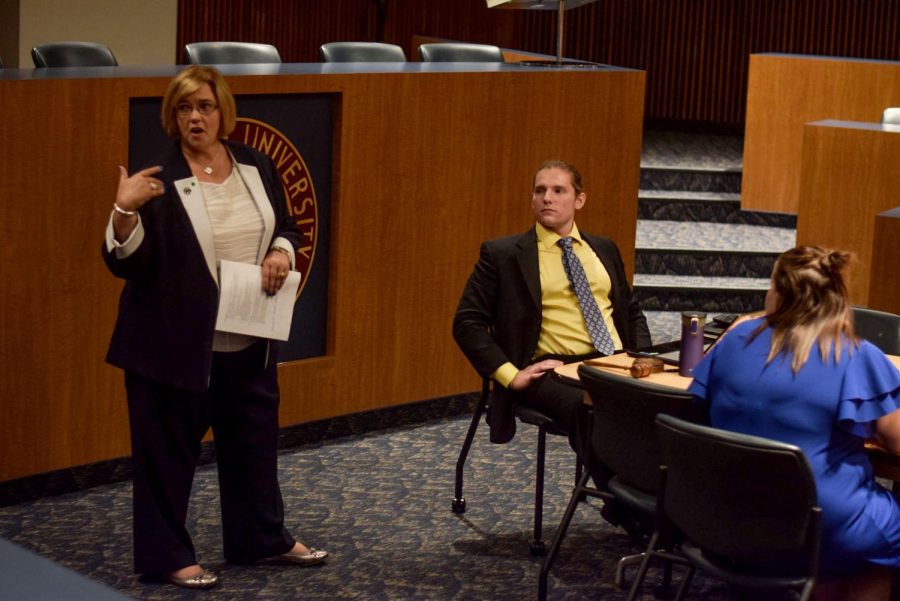University hopes to remedy meal plan madness; USG weighs in
During the Undergraduate Student Government meeting Wednesday evening, Vice President of Student Affairs Shay Little applauded Dining Services for the turkey burger she ate for lunch at Eastway Fresh Food Company.
Toward the end of the meeting, a USG senator shared her experience with the same meal.
“Honestly, that turkey burger that Shay Little [had] was not …” she trailed off, laughs sounding through the room. “I understand why students are saying that things are not that great. They’re just not the same quality that they were in past years.”
Students and the university have stood divided on meal plan changes since the start of the semester.
A new swiping system, along with Decling Balance Dollars, is part of the meal plan changes Kent State implemented this fall. Meal swipes are accepted at three dining halls on campus: Eastway, The Market and Prentice Cafe.
Students living on campus are required to purchase a meal plan, but students living off campus are exempt.
At the meeting, Little addressed the uproar from students, who she said she considers “first in every aspect of what we do.”
“I want you to know that changes are happening and student voices are heard,” she told USG members.
The changes began Tuesday evening, when Dining Services expanded the Meal Exchange features to include meal options at Rosie’s Market. Little said Rosie’s also “updated and expanded some equipment,” like grills and fryers.
Meal Exchange — advertised on Dining Services’ website as “an added bonus to the All-Access and Block meal plans” — can swap a meal swipe for another food option at other dining facilities, like Rosie’s Diner, the George T. Simon III Cafe or The Cue Express in Olson Hall.
Little said late-night Meal Exchange is also opening up at Munchies Market in Prentice Hall and the deli on the first floor of Eastway.
Little reiterated she is personally committed to working with Dining Services to address issues expressed by students via social media.
“I also know that there have been challenges about product availability and consistency in service and operations overall in the dining halls, and that’s not acceptable either,” Little said. “Our students deserve better. I demand better from our partners to deliver that to students, and I want you to know that every effort is being made to hold those expectations to a very high level.”
The partner, Aramark LLC — a food and beverage service provider — was approved by the Board of Trustees in March 2017.
Little encouraged USG members to share information with students so they can voice their feedback.
Students can fill out a survey at www.yourdiningvoice.com. Little said students can share anything from positive experiences with employees of the dining halls to concerns regarding food quality. Another option to leave comments or concerns is Dining Services’ email, [email protected].
Jonathan Merlo, the director of community affairs for USG, asked Little if she could provide a list of the coming changes so members could relay information to students.
Little said she would follow up once it’s clearer which changes will take place soon versus changes that require more dialogue with students and may happen later in the semester.
Dean of Students Lamar Hylton also attended the meeting, and he praised Little for her efforts in addressing students’ reactions to meal plan changes.
“Dining has become a very big thing, a very big topic of discussion for all of us involved, and I need you all to know that you have no better champion in that discussion than your vice president for student affairs.” Hylton said. “ … She has been working tirelessly on your behalf, on this entire student body’s behalf to ensure you are receiving the best service possible.”
After Little and Hylton left, USG President Thomas Watral echoed meal plans are a hot topic at the university, and “rightfully so.”
“I’m hoping we can get it mitigated, you know, with Aramark,” Watral said. “It really is just a mess.”
Madison Newingham, the chief of staff for USG, spoke next, and she suggested waiting on writing legislation over the meal plans.
“Let’s give it a little bit of time so Dr. Little can look at it, rather than jumping in right into something, passing it, making a bunch of people mad and cutting off some ties,” Newingham said.
Harrison Sorm, the USG senator for the College of Arts and Science, felt the opposite.
“Just a reminder, we weren’t voted in to be the administration’s friends,” Sorm said. “We were meant to be the attack dogs.”
Annelise Stopar, the USG senator for commuter and off-campus students, looked into price comparisons for groceries on campus and stores off campus.
She found Oreos on campus cost $5.49, but only $2.82 at Walmart. Shredded cheese on campus, though she didn’t specify what kind, cost $5.99, but Walmart offers the same size bag for $1.50.
She added that students have expressed health concerns over the dining changes. A diabetic student shared with Stopar that she needs to eat small, more frequent meals throughout the day to maintain her health, “and she doesn’t have time to go sit down” because of the new meal-swiping policy.
Students with eating disorders have also had complaints, Stopar said. Some have fears of eating in public, and others are dealing with binge disorders.
Thomas Beeler, the USG senator at-large for sustainability, shared he has plans to meet with Aramark employees — Resident District Manager Mike Mesenbrink and Administrative Assistant Kelly Connelly — on Wednesday morning to discuss setting up composting on campus through the dining halls.
“If they ask me how I feel about the dining otherwise, I will respectfully share my thoughts,” Beeler said with a smile, garnering laughs from around the Governance Chambers.
Valerie Royzman is the features editor. Contact her at [email protected].



